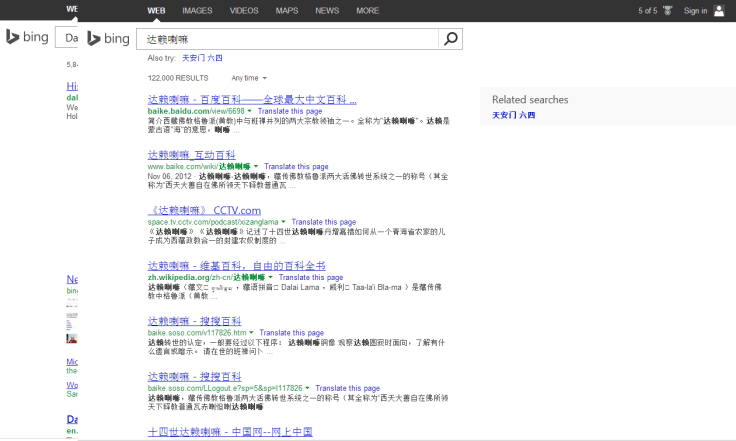Microsoft's Bing Search Engine Accused Of Self-Censoring Chinese-Language Search Results [PHOTOS]

A Chinese Internet advocacy group has accused Microsoft Corp.’s (NASDAQ:MSFT) search engine Bing of censoring its Chinese-language search results for users in the United States. The accusations come on the heels of other Western companies compromising to maintain relations with China.
According to GreatFire.org, a website dedicated to monitoring China’s censorship entity, the Great Firewall, some particularly sensitive, or “splittist,” search terms for things such as the Dalai Lama, the Tiananmen Square protests in 1989, and the Falun Gong returned censored results.
Percy Alpha, a GreatFire.org participant, who spoke to Voice of America under a pseudonym about the controversial topic for fear of getting into trouble with authorities, said that Bing is filtering out certain links and stories that Chinese authorities would consider damaging.
“If I search Dalai Lama, almost all results on the first page, even on international Bing, are from Chinese [state-owned] media … and the Bing results mostly portray the Dalai Lama in a negative way,” Alpha said.
For example, a search for the Dalai Lama in Chinese on Bing is followed by a documentary by China’s main broadcasting channel, CCTV, which generally sheds a negative light on the Tibetan religious figure. A search on the English version of Bing generates a list of different websites like the Dalai Lama’s official Web page, and even Phayul.com, which is a pro-Tibetan independence advocacy site.
The results for the Chinese-language search terms on the search engine from Google Inc. (NASDAQ:GOOG), which pulled out of the China market in 2010 because the company refused to practice self-censorship, didn't appear to be limiting the results. Because it uses a different search algorithm, the results listed aren't identical to Bing’s but do encompass a mixture of both Western and Chinese sites.
“It’s a bit crazy,” Charlie Smith, author of the GreatFire censorship blog, told the Guardian. “Any Chinese person who is searching in Chinese from overseas is being treated as if they have the same rights as a resident of mainland China. So we won’t show them the accurate search results if they search for Dalai Lama. What you get is state-controlled propaganda.”
There's an understanding within China’s borders that when someone seeks information, especially on polarizing topics, there's a chance of getting filtered or curated results. But on the other side of the firewall, people don’t have this expectation, critics say. “They don’t tell you the results have been censored," Smith said. "If you were in China, they would at least tell you that.”
While Microsoft's search engine accounts for only a small percentage of China's search-engine market share, the company has expansion plans and is building up its Web services on the mainland.
At the end of last year, Bloomberg News was accused of altering its Chinese news coverage after a story delving into Chinese financials was allegedly axed by editor-in-chief Matthew Winkler. As a result of various blocks of media sites in mainland China, in addition to reporter visa issues, Bloomberg’s decision to kill the story was viewed by many critics as a way to remain in the China market.
© Copyright IBTimes 2024. All rights reserved.





















